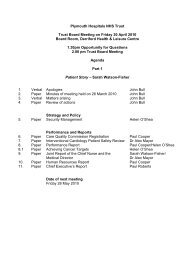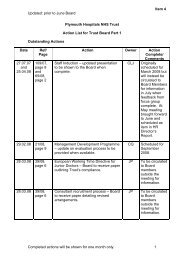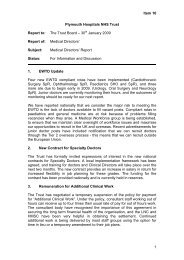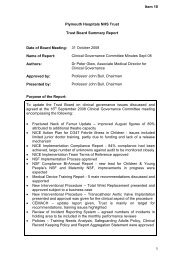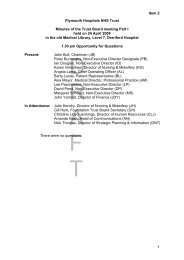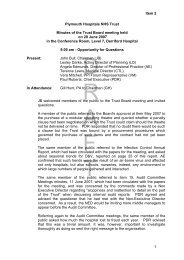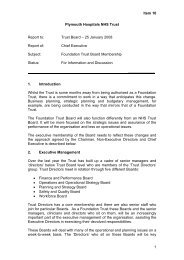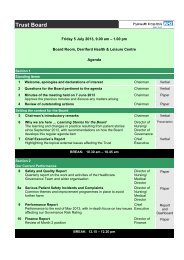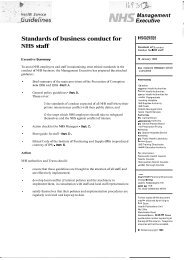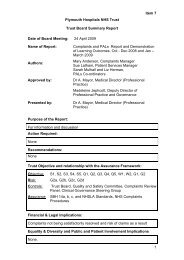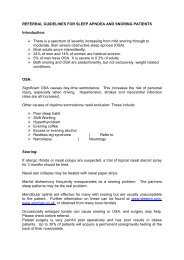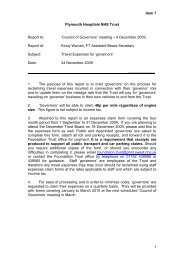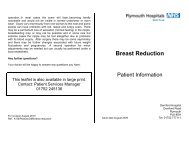Breast augmentation patient information leaflet - Plymouth Hospitals
Breast augmentation patient information leaflet - Plymouth Hospitals
Breast augmentation patient information leaflet - Plymouth Hospitals
You also want an ePaper? Increase the reach of your titles
YUMPU automatically turns print PDFs into web optimized ePapers that Google loves.
Introduction<br />
The size of a woman’s breast will largely be determined by genetics,<br />
but it will also be influenced by fluctuations in weight, pregnancy,<br />
breast feeding and hormonal changes. Some women have problems<br />
with asymmetry (one breast much larger than the other). Others<br />
have very small breasts, breasts that are out of proportion for their<br />
frame or breasts that decrease in size after pregnancy. Surgery<br />
would not usually be offered to a teenage girl whose breasts have<br />
not have reached full maturity. At Derriford Hospital, the Primary<br />
Care Trust severely limits who we can perform <strong>Breast</strong> Augmentation<br />
surgery on. The Complex Cases Panel will need to approve the<br />
funding before we are allowed to place you on the list.<br />
What does the surgery involve?<br />
<strong>Breast</strong> enlargement surgery will usually be performed under a<br />
general anaesthetic, it takes one to two hours and in some cases<br />
might be performed as a day case without the need for an overnight<br />
stay in hospital. The surgery involves placement of an implant either<br />
under the skin and breast tissue or deeper under the muscle under<br />
the breast. There are many different types of implant available.<br />
They all have a silicone outer layer but may be filled with silicone<br />
(cohesive gel that doesn’t run if cut), saline (salt water), oils or a<br />
combination of these. The choice of implant should be discussed<br />
with your surgeon and the position of the scars should also be<br />
discussed. There are different techniques available which result in<br />
different scars either under the breast, around the nipple or in the<br />
armpit.<br />
Before the operation, depending on your age and fitness, you may<br />
have to undergo some simple health checks such as blood tests and<br />
a mammogram. If you decide on surgery you will be required to sign<br />
a consent form giving permission for the operation. This requires that<br />
you are aware of the risks and complications involved with the<br />
procedure.<br />
What will happen in the recovery period?<br />
After the operation there will be swelling and pain and you will be<br />
advised to take pain killers and wear a supportive bra day and night.<br />
You may have dissolvable stitches, but any permanent stitches will<br />
need to be removed at around 10 days.<br />
What is the recovery time?<br />
You should avoid lifting, driving and strenuous activity for up to 3<br />
weeks. Depending on your job, you should be able to return to work<br />
2 to 4 weeks after the operation.<br />
Are there any complications?<br />
There are general risks associated with a general anaesthetic<br />
including chest infection and DVTs (clots in the veins of the legs).<br />
There are risks specific to breast surgery. Bleeding, sometimes<br />
requiring a return to theatre, problems with wound healing and<br />
infection can occur, particularly in those who smoke. It is therefore<br />
advisable to stop smoking before the operation. In some cases<br />
infection might result in the implant having to be removed. In most<br />
cases the scars will fade and be hardly noticeable and would not be<br />
visible in underwear or swim wear. Scars vary enormously from one<br />
woman to the next and some people can have problems with red,<br />
raised, and lumpy scars. Internal scarring around the implant, known<br />
as a capsule, occurs to some extent in up to 10% of women. In the<br />
worst cases this leads to hard painful breasts and may require<br />
further surgery. Asymmetry (one side different in size or shape) can<br />
occasionally be a problem, as can numbness or altered sensation.<br />
Rupture or leakage of the implant is rare. Despite media reports,<br />
there is currently no evidence linking silicone implants to increased<br />
risk of breast cancer or other health problems such as autoimmune<br />
diseases and rheumatoid arthritis. It is possible to have<br />
mammograms after breast enlargement surgery but you will need to<br />
tell the person doing the mammogram that you have implants. It<br />
should also be possible to breast feed in many cases.<br />
C:\DOCUME~1\EASYPD~1\LOCALS~1\Temp\BCL Technologies\easyPDF 6\@BCL@E00F0913\@BCL@E00F0913.doc



